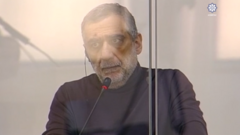In Romania, efforts to remove honors associated with fascists from the country's past are thwarted by national identity concerns, revealing a growing inclination towards ultranationalism.
Romania's Struggle with its Fascist Legacy: A Shift Towards Ultranationalism

Romania's Struggle with its Fascist Legacy: A Shift Towards Ultranationalism
Romania's refusal to confront its World War II history underscores a troubling trend toward ultranationalism, experts warn.
Romania finds itself grappling with the legacy of its past, where the glorification of fascist figures during World War II continues to pose challenges to national identity. A recent attempt by Bucharest city councilor Diana Mardarovici to rename a prominent avenue that celebrated Mircea Vulcanescu, a convicted war criminal from that era, highlights the resistance against acknowledging past atrocities.
Despite the clear connection of Vulcanescu’s actions to the suffering inflicted on Jewish communities during the war, Mardarovici's proposal did not even reach the voting stage in city council. The councilor expressed her frustration, noting that neither hate nor disdain characterized her colleagues' views but rather a need to uphold a narrative they believed defined their national pride.
This incident reflects a broader trend in Romania, where many attempts to erase the remnants of the country's fascist history, including the removal of street names and statues commemorating notorious figures, have consistently stalled. Figures hailed for their cultural contributions during their lifetime now stand as controversial symbols, complicating public discourse.
As Romanians continue to negotiate their national identity, the drive towards ultranationalism is sparked partly by a collective unwillingness to confront a past steeped in complicity with the Nazi regime. Rather than seeking to confront historical injustices, many citizens find solace in honoring figures like Vulcanescu, viewing them as pivotal in shaping Romanian culture and resisting communism.
Consequently, experts are voicing concern about the implications of this trend, suggesting that it hinders Romania's ability to engage openly with its history and could further distance the nation from a reconciliatory view of its identity on the European stage. The challenge lies not only in changing street names but also in reshaping the narrative that defines Romania's place in history.



















